
Patrick Michael Rafter is an Australian former world No. 1 tennis player. He reached the top Association of Tennis Professionals (ATP) singles ranking on 26 July 1999, holding it for one week. His career highlights include consecutive US Open titles in 1997 and 1998, consecutive runner-up appearances at Wimbledon in 2000 and 2001, winning the 1999 Australian Open men's doubles tournament alongside Jonas Björkman, and winning two singles and two doubles ATP Masters titles.

Jan Stefan Edberg is a Swedish former world No. 1 professional tennis player. A major practitioner of the serve-and-volley style of tennis, he won six Grand Slam singles titles and three Grand Slam men's doubles titles between 1985 and 1996. He is one of only two men in the Open Era to have been ranked world No. 1 in both singles and doubles, the other being John McEnroe. Edberg also won the Masters Grand Prix and was a part of the Swedish Davis Cup-winning team four times. In addition, he won four Masters Series titles, four Championship Series titles and the unofficial 1984 Olympic tournament, was ranked in the singles top 10 for ten successive years and ranked nine years in the top 5. After retirement, Edberg began coaching Roger Federer in January 2014, with this partnership ending in December 2015.

John Lloyd is a British former professional tennis player. Lloyd reached an ATP world ranking of 21 in July 1978, and was ranked as UK number 1 in 1984 and 1985. He now works as a tennis commentator.

Ramesh Krishnan is an Indian tennis coach and former professional tennis player. As a junior player in the late 1970s, he won the singles titles at both, Wimbledon and the French Open. He went on to reach three Grand Slam quarterfinals in the 1980s and was a part of the Indian team captained by Vijay Amritraj which reached the final of the Davis Cup in 1987 against Sweden. Krishnan also beat then-world No. 1, Mats Wilander, at the 1989 Australian Open. He became India's Davis Cup captain in 2007.

Paul McNamee is an Australian former doubles world No. 1 tennis player and prominent sports administrator.
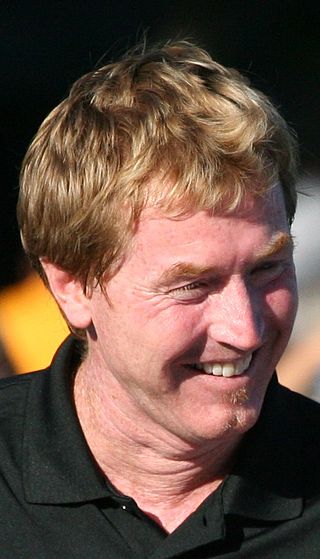
Mark Raymond Woodforde, OAM is a former professional tennis player from Australia. He is best known as one half of "The Woodies", a doubles partnership with Todd Woodbridge.
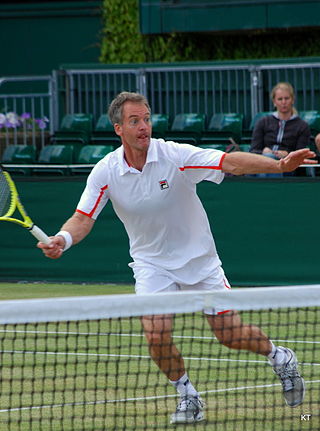
Anders Per Järryd is a former professional tennis player from Sweden. During his career he won eight Grand Slam doubles titles, reached the world No. 1 doubles ranking, and achieved a career-high singles ranking of world No. 5.

Robert "Bob" Charles Bryan is an American former doubles world No. 1 tennis player. He won 23 major titles: 16 in men's doubles and 7 in mixed doubles. He turned professional in 1998. With his twin brother Mike, he was the world No. 1 doubles player for several years, first achieving the top ranking in September 2003. The brothers were named the ATP Team of the Decade for 2000–2009. They became the second men's doubles team to complete the career Golden Slam at the 2012 London Olympics.
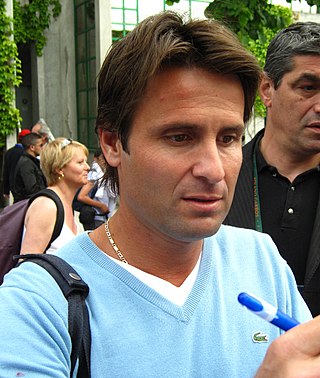
Fabrice Vetea Santoro is a French former professional tennis player. Successful in both singles and doubles, he had an unusually long professional career, with many of his accomplishments coming towards the end of his career, and he is popular among spectators and other players alike for his winning demeanor and shot-making abilities; he is also one of a rare breed of player who plays two-handed on both the forehand and backhand sides.

Michael Jeremy Bates is a British former professional tennis player. He was ranked UK number 1 in 1987 and from 1989 to 1994. He reached a career-high ATP world ranking of 54 from 17 April 1995 to 23 April 1995.

Rick Leach is a former professional tennis player and a coach from the United States. A doubles specialist, he won five Grand Slam doubles titles, and four mixed doubles titles. He reached the world No. 1 doubles ranking in 1990.
Jim Pugh is a former professional tennis player from the United States. He grew up in Palos Verdes, California and at age 10 began taking tennis lessons from John Hillebrand. He played tennis at UCLA. He became a doubles specialist on the ATP Tour and won three Grand Slam men's doubles titles and five Grand Slam mixed doubles titles. Pugh reached the world No. 1 doubles ranking in 1989.

The 2006 ATP Tour was the global elite men's professional tennis circuit organised by the Association of Tennis Professionals (ATP) for the 2006 tennis season. The ATP Tour is the elite tour for professional tennis organized by the Association of Tennis Professionals. The ATP Tour includes the four Grand Slam tournaments, the Tennis Masters Cup, the ATP Masters Series, the International Series Gold and the International Series tournaments.
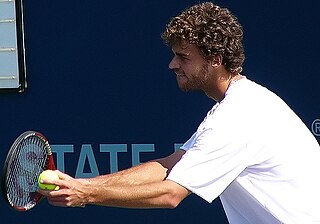
The Association of Tennis Professionals (ATP) Tour is the elite professional tennis circuit organised by the ATP tour. The 2000 ATP Tour calendar comprises the Grand Slam tournaments, the tennis event at the 2000 Summer Olympics, the Tennis Masters Series, the ATP International Series Gold, the ATP International Series, the ATP World Team Cup, the Tennis Masters Cup and the ATP Tour World Doubles Championships. Also included in the 2000 calendar are the Davis Cup and the Hopman Cup, which do not distribute ranking points, and are both organised by the ITF.

The Association of Tennis Professionals (ATP) World Tour is the elite professional tennis circuit organized by the ATP. The 2010 ATP World Tour calendar comprises the Grand Slam tournaments, the ATP World Tour Masters 1000, the ATP World Tour 500 series, the ATP World Tour 250 series, the ATP World Team Championship, the Davis Cup, and the ATP World Tour Finals. Also included in the 2010 calendar is the Hopman Cup, which does not distribute ranking points, and is organized by the ITF.

The 2011 ATP World Tour was the elite men's professional tennis circuit organized by the Association of Tennis Professionals (ATP) for the 2011 season. It was the 42nd edition of the tour and the calendar comprised the Grand Slam tournaments, supervised by the International Tennis Federation (ITF), the ATP World Tour Masters 1000, the ATP World Tour 500 series, the ATP World Tour 250 series, the ATP World Team Championship, the Davis Cup, and the ATP World Tour Finals. Also included in the 2011 calendar is the Hopman Cup, which does not distribute ranking points, and is organized by the ITF.
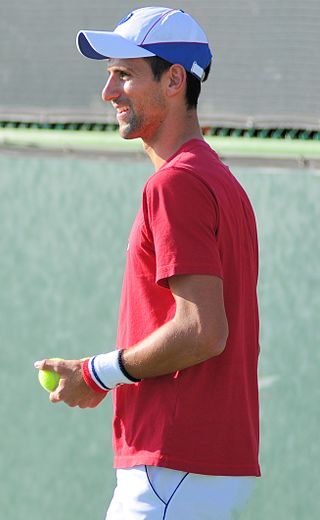
The 2012 ATP World Tour is the global elite professional tennis circuit organized by the Association of Tennis Professionals (ATP) for the 2012 tennis season. The 2012 ATP World Tour calendar comprises the Grand Slam tournaments, the ATP World Tour Masters 1000, the ATP World Tour 500 series, the ATP World Tour 250 series, the ATP World Team Championship, the Davis Cup, the ATP World Tour Finals, and the tennis event at the London Summer Olympic Games. Also included in the 2012 calendar is the Hopman Cup, which is organized by the ITF and does not distribute ranking points.
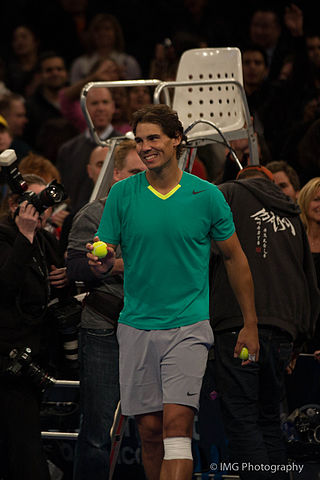
The 2013 ATP World Tour was the global elite professional tennis circuit organized by the Association of Tennis Professionals (ATP) for the 2013 tennis season. The 2013 ATP World Tour calendar comprises the Grand Slam tournaments, the ATP World Tour Masters 1000, the ATP World Tour 500 series, the ATP World Tour 250 series, the Davis Cup and the ATP World Tour Finals. Also included in the 2013 calendar is the Hopman Cup, which was organized by the ITF and does not distribute ranking points.
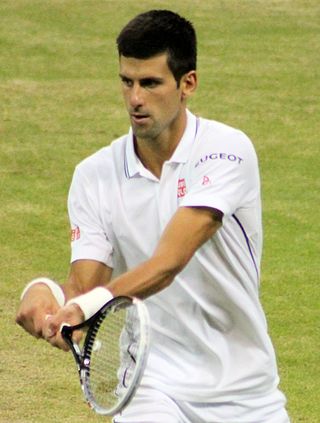
The 2014 ATP World Tour was the global elite men's professional tennis circuit organized by the Association of Tennis Professionals (ATP) for the 2014 tennis season. The 2014 ATP World Tour calendar comprises the Grand Slam tournaments, the ATP World Tour Masters 1000, the ATP World Tour 500 series, the ATP World Tour 250 series, the Davis Cup and the ATP World Tour Finals. Also included in the 2014 calendar is the Hopman Cup, which is organized by the ITF and does not distribute ranking points.

The 2015 ATP World Tour was the global elite men's professional tennis circuit organized by the Association of Tennis Professionals (ATP) for the 2015 tennis season. The 2015 ATP World Tour calendar comprises the Grand Slam tournaments, the ATP World Tour Masters 1000, the ATP World Tour 500 series, the ATP World Tour 250 series, the Davis Cup and the ATP World Tour Finals. Also included in the 2015 calendar is the Hopman Cup, which is organized by the ITF and does not distribute ranking points.


















